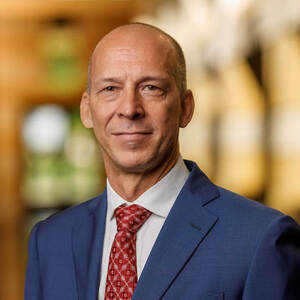Keough School expert to play key role in COP28 climate talks on food systems
Climate change research has typically focused on the energy sector and the need to adopt cleaner technologies to power homes, cars and factories. But a growing awareness of how our food systems contribute to global warming has brought increasing numbers of agriculture experts to the discussion table.
For the first time in history, agriculture will be part of the 28th annual United Nations Climate Change Conference (COP28) discussions. Paul Winters, associate dean for academic affairs at the Keough School of Global Affairs at the University of Notre Dame and executive director of the Innovation Commission for Climate Change, Food Security and Agriculture, will be attending COP28 and leading part of those discussions at the conference.

Known as the world’s highest decision-making conference on climate issues, COP28 is expected to host more than 70,000 delegates to discuss climate action among 197 countries, plus the European Union and thousands of nongovernmental stakeholders. This year’s conference takes place Nov. 30 through Dec. 12 in Dubai, United Arab Emirates.
“Agriculture is one of the industries that both contributes to climate change and is also most impacted by it,” Winters said. “But this has not traditionally been recognized by those addressing the issue. Having a global platform that includes people from multiple sectors is a game changer when it comes to addressing climate change while also protecting some of our most vulnerable populations.”
Prior to presenting at COP28, Winters will discuss agriculture and climate change at “The Road to COP28: Agricultural Innovations to Address Climate Change and Food Security,” a public event taking place from 9 to 10:15 a.m. Nov. 16 (Thursday) at the Keough School of Global Affairs Washington Office. He will be joined by Sen. Debbie Stabenow; Cary Fowler, special envoy for global food security in the Office of Global Food Security at the U.S. Department of State; Chavonda Jacobs-Young, under secretary for research, education and economics at the U.S. Department of Agriculture; and William R. Sutton, global lead for climate smart agriculture and lead agricultural economist at the World Bank.
Agriculture and climate change
The agricultural food system — from production to consumption — contributes 25 to 33 percent of total greenhouse gas emissions, ranking it second only to energy in terms of total emissions, according to research led by the European Commission Joint Research Centre.
Furthermore, around 1.23 billion people are employed in the world’s agricultural food systems, and almost half of the world’s population lives in households linked to these systems, according to research conducted by Winters and his collaborators.
While researchers have now begun to report on the impact agriculture has on climate change, Winters said previous solutions proposed for addressing climate change could negatively impact some of the world’s poorest populations whose livelihoods depend on agriculture.
With research showing that climate change continues to push millions of people into extreme poverty — the majority due to the impact on agriculture — Winters said researchers and activists focused on climate change, and those working in agriculture, are now starting to converge around the idea of food system transformation.
“The goal is to scale agriculture and climate innovations globally that will both address climate change and help people and countries who rely on agriculture,” Winters said.
The COP28 presidency will call on leaders to sign the Declaration on Resilient Food Systems, Sustainable Agriculture and Climate Action, which calls on countries to address the interlinked challenges across climate change and the food system in their climate action plan.
“The food space can be very political, with different points of views across countries,” Winters said. “But the one thing that can bring them all together is innovation. By using innovation to address food systems and climate change, we can tackle some of our biggest climate issues while not only avoiding negatively impacting some of the world’s poorest populations, but actually helping them.”
Alongside these efforts, in conjunction with COP28, Winters and members of the Innovation Commission for Climate Change, Food Security and Agriculture have identified seven innovation areas with evidence-based pathways to benefit the millions of farmers whose lives and livelihoods are impacted by climate change.
The seven innovation areas include:
-
Improved weather forecasts to help farmers manage increased weather variability and improve agricultural decisions.
-
Digital agricultural extension services to provide customized and timely information to farmers at a low cost.
-
Climate-responsive social protection programs to help households anticipate weather shocks, overcome extreme poverty and develop resilience.
-
Training to promote rainwater harvesting techniques to help reduce land degradation, increase crop yields and combat desertification.
-
Microbial fertilizers to reduce emissions from synthetic fertilizer production while helping farmers increase productivity.
-
Innovations to reduce livestock methane emissions through improved feeding management, feed additives and genomic selection.
-
Alternative proteins to provide a low-emissions, low-cost and high-quality source of proteins.
Winters said he is heartened by the fact that food systems will play such a prominent role in the discussions leading up to and during COP28. He hopes that the high-level climate talks taking place in Dubai will draw additional attention to the need for making food systems more sustainable and equitable while also alleviating the negative environmental effects.
“Food systems play a crucial role in society and should be at the forefront of global conversations around climate change,” Winters said. “The fact that agriculture is a part of COP28 is an important step in the right direction.”
Contact: Tracy DeStazio, associate director of media relations, 574-631-9958 or tdestazi@nd.edu
Latest International
- University of Notre Dame joins the Global Coalition of Ukrainian StudiesThe University of Notre Dame has joined the Global Coalition of Ukrainian Studies after signing a memorandum of cooperation, formalized Sept. 24, at the Ukrainian Institute of America in New York City. Notre Dame joined four other American institutions that were also publicly welcomed to the coalition at this event: Arizona State University, Columbia University, Manor College and the Shevchenko Scientific Society.
- Statement from University President Rev. Robert A. Dowd, C.S.C., on the anniversary of the atomic bombing of HiroshimaToday, on the anniversary of the bombing of Hiroshima, Father Dowd offered remarks at the Elisabeth University of Music as a guest of its president, Yuji Kawano, and Bishop Alexis Mitsuru Shirahama of Hiroshima. Father Dowd focused on the role that universities can play in addressing the current nuclear predicament and the wider challenges of peace in today’s world.
- Vatican honors Martin and Carmel Naughton with papal awardThe late Pope Francis, in one of his last acts, conferred the honour of the Order of Saint Gregory the Great upon Carmel and Martin Naughton, Trustee Emeritus of the University of Notre Dame. The papal honor is in recognition of the Naughtons’ outstanding philanthropy in the areas of education and the arts, particularly in the provision of philanthropic support and scholarships to Catholic education at the University of Notre Dame and Kylemore Abbey, and in their transformative contributions to higher education in Ireland.
- Prioritizing prenatal care may decrease low birth weight outcomes in The Gambia, Notre Dame research findsA new study co-authored by University of Notre Dame researchers highlights the importance of prenatal care for improving the health of mothers and newborns, providing evidence that can inform policy.
- Navigating the waters of peace: Researchers address challenges, opportunities in implementation of Colombia's Peace AgreementNearly half of the commitments outlined in Colombia's historic peace accord face significant challenges and may not happen in time unless policymakers make several key interventions, warns a new report from Notre Dame's Peace Accords Matrix. The report offers a blueprint to salvage an accord that has lagged behind its implementation deadlines, putting its legacy at risk. It highlights timely fixes that can strengthen the agreement.
- Partial peace deals may facilitate comprehensive accords, offering roadmap for policymakers, practitionersPartial peace agreements — deals that address targeted issues on the way to larger comprehensive accords — could provide a blueprint for peacebuilding policymakers and practitioners, according to new University of Notre Dame research.













